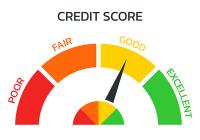Understanding Your Credit Score – Part I

What, exactly does your credit score mean? Briefly, a credit score is a number used to predict how likely you are to pay your bills, or make loan payments on time. It is a three digit number, typically between 300 and 850, with the higher score associated with better credit terms.
Who gets to determine your credit score? There are three national Credit Reporting Agencies, or credit bureaus - Equifax®, Experian®, and TransUnion®. These agencies calculate your credit score based on the content of your consumer file, reported to them by creditors and lenders. Many, but not all creditors and lenders, report information to all three agencies. Since the three agencies might receive different information, your score could be different at each agency.
How is your credit score determined? There are different models used to determine your credit score. One of the most commonly used models is called FICO® (named after its creator, the Fair Isaac Corporation).
Additionally, credit reporting agencies will tailor the scoring model for different types of lenders. For example, the model and score might be different if you were applying for a car loan, versus a mortgage.
The scoring models consider various factors, and assign different weights to each factor. Many models will consider your:
- Payment history
- Used credit v. available credit
- Types of credit
- Credit history length
The first, and most important factor is your payment history, including how you have repaid or are handling payments for various existing sources of credit. The agencies take into consideration whether you have paid your bills on time or not and factors such as how many late payments, for how long and on what amount of balance. Your payment history likely will have the biggest impact in determining your credit score.
Another key part of your credit score analyzes how much total credit you are using, relative to how much you have available. This is known as your revolving credit utilization. For example, if you have a credit card with a $3,000 limit, and you only owe $500, you are using $500 of the credit, with $2,500 available credit. All your lines of credit are included in this analysis.
Your credit score reflects your mix of tradelines, including revolving debt and installment loans. Creditors like to see that you are able to manage multiple credit lines of different types. However, it’s nearly impossible to tell exactly the right number of each kind of account that will give you the best score, because everyone’s situation is different. Over time you will want to create a good mix of account types on your report without a concentration in any one segment. For example, it’s good to have a mortgage, a car loan or two, and two or three credit cards to spread your balances over. But, keep in mind that your score might suffer if you also have multiple finance company (or unsecured installment loan) accounts, even if you are paying your bills on time. Moderation in the total number of accounts of any particular type is the key!
Your credit score also reflects how many new credit accounts you have opened, or have attempted to open compared with the total number of credit lines in your credit file. People are often concerned about “hits” to their credit. Any business or person who receives a copy of your credit report will be listed under the “Inquiries” section of your credit report. Although they do not really account for a large percentage of the total, piling on too many inquiries for credit can negatively affect your score. The lesson here is to be careful in how often you apply for credit, and with whom.
Your credit score does not take into account requests a creditor has made to make a preapproved credit offer, or to review your existing account with them. Nor does it take into account your own request for a copy of your credit history. These requests are known as “soft pulls” of your credit.
Finally, credit scores factor in how long your credit accounts have been established. The credit score calculation includes both how long your oldest and most recent accounts have been open. In general, creditors like to see that you have been able to properly handle credit accounts over a period of time.
In the next article of this series, we will discuss how to improve your credit score, reviewing your credit report and the benefits of freezing your credit.
Read the Financial Planning Focus May 2022:
- "To Roth or Not to Roth" by Victoria Henry, CFP® »
- "I Can't Believe I'm Retiring" by Kimberly A. Cox, CFP® »
Source
• Equifax – www.equifax.com
• Experian – www.experian.com
• Transunion – www.transunion.com
• Consumer Finance Protection Bureau – www.consumerfinance.gov
IMPORTANT DISCLOSURES
- West Financial Services, Inc. (“WFS”) offers investment advisory services and is registered with the U.S. Securities and Exchange Commission (“SEC”). SEC registration does not constitute an endorsement of the firm by the SEC nor does it indicate that the firm has attained a particular level of skill or ability. You should carefully read and review all information provided by WFS, including Form ADV Part 1A, Part 2A brochure and all supplements, and Form CRS.
- Certain information contained herein was derived from third party sources, as indicated, and has not been independently verified. While the information presented herein is believed to be reliable, no representation or warranty is made concerning the accuracy of any information presented. Where such sources include opinions and projections, such opinions and projections should be ascribed only to the applicable third party source and not to WFS.
- This information is intended to be educational in nature, and not as a recommendation of any particular strategy, approach, product or concept. These materials are not intended as any form of substitute for individualized investment advice.

